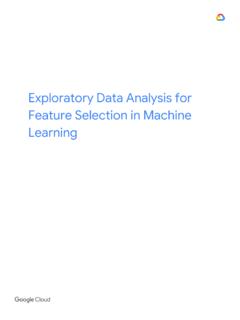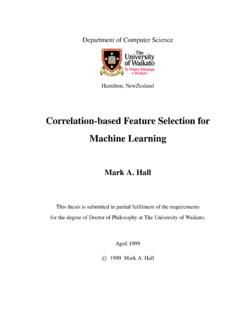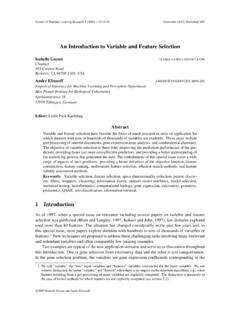Transcription of M.Sc Data Science - Vellore Institute of Technology
1 SCHOOL OF ADVANCED SCIENCES Data Science ( MDT) Curriculum (2019-2020 onwards) Data Science Page 2 VISION STATEMENT OF Vellore Institute OF Technology Transforming life through excellence in education and research. MISSION STATEMENT OF Vellore Institute OF Technology World-class Education: Excellence in education, grounded in ethics and critical thinking, for improvement of life. Cutting edge Research: An innovation ecosystem to extend knowledge and solve critical problems. Impactful People: Happy, accountable, caring and effective workforce and students.
2 Rewarding Co-creations: Active collaboration with national & international industries & universities for productivity and economic development. Service to Society: Service to the region and world through knowledge and compassion. VISION STATEMENT OF THE SCHOOL OF ADVANCED SCIENCES To be an internationally renowned department in teaching, innovative research and high impact publications toward addressing the current societal problems. MISSION STATEMENT OF THE SCHOOL OF ADVANCED SCIENCES Our mission is to educate students from all over India, including those from the local and rural areas, and from other countries, so they become enlightened individuals, improving the living standards of their families, industry and society.
3 We will provide individual attention, world-class quality education and take care of character building. Data Science Page 3 Data Science PROGRAMME EDUCATIONAL OBJECTIVES (PEOs) 1. Graduates will demonstrate proficiency with statistical analysis of Data. 2. Graduates will execute statistical analyses with professional statistical software. 3. Graduates will demonstrate skill in Data management. 4. Graduates will develop the ability to build and assess Data-based models. 5. Graduates will apply data Science concepts and methods to solve problems in real-world contexts and will communicate these solutions effectively Data Science Page 4 Data Science PROGRAMME OUTCOMES (POs) PO_02: Having a clear understanding of the subject related concepts and contemporary issues.
4 PO_06: Having problem-solving ability- to assess social issues (societal, health, safety, legal and cultural) and engineering problems. PO_08: Having a clear understanding of professional and ethical responsibility. PO_09: Having cross-cultural competency exhibited by working as a member or in teams. PO_10: Having a good working knowledge of communicating in English communication with the engineering community and society. Data Science Page 5 Data Science ADDITIONAL PROGRAMME OUTCOMES (APOs) APO_01: Having an ability to be socially intelligent with good SIQ (Social Intelligence Quotient) and EQ (Emotional Quotient) APO_04: Having computational thinking (Ability to translate vast data into abstract concepts and to understand database reasoning APO_05: Having Virtual Collaborating ability APO_07: Having critical thinking and innovative skills APO_08.)
5 Having a good digital footprint Data Science Page 6 Data Science PROGRAMME SPECIFIC OUTCOMES (PSOs) On completion of Data Science programme, graduates will be able to PSO1: To become a skilled Data Scientist in industry, academia, or government. PSO2: To use specialist software tools for data storage, analysis and visualization. PSO3: Able to independently carry out research/investigation to solve practical problems Data Science Page 7 Data Science CREDIT STRUCTURE Category-wise Credit distribution Category Credits University core (UC) 29 Programme core (PC) 23 Programme elective (PE) 22 University elective (UE) 06 Total credits 80 Data Science Page 8 Data Science DETAILED CURRICULUM University Core S.
6 No. Course Code Course Title L T P J C 1 MAT5010 Foundations of Data Science 3 0 0 0 3 2 RES5001 Research Methodology 2 0 0 0 2 3 SET5001 Science , Engineering and Technology Project I 0 0 0 0 2 4 SET5002 Science , Engineering and Technology Project II 0 0 0 0 2 5 SET5003 Science , Engineering and Technology Project III 0 0 0 0 2 6 MAT6099 Master's Thesis 0 0 0 0 14 7 ENG5003/FRE5001/ GER5001 English for Science and Technology / French/ German 0 2 2 0 0 0 4 0 0 0 0 0 2 2 2 8 STS4001 Essentials of Business Etiquettes-Soft Skills 3 0 0 0 1 9 STS4002 Preparing for Industry 3 0 0 0 1 Data Science Page 9 Data Science Programme Core S.
7 No. Course Code Course Title L T P J C 1 MAT5011 Matrix Theory and Linear Algebra 3 0 0 0 3 2 MAT5012 Probability Theory and Distributions 3 0 2 0 4 3 MAT5013 Statistical Inference 3 0 2 0 4 4 MAT6002 Regression Analysis and Predictive Models 3 0 2 0 4 5 MAT5016 Time series analysis and Forecasting 3 0 2 0 4 6 MAT5017 Multivariate Data Analysis 3 0 2 0 4 Data Science Page 10 Data Science Programme Elective S. No. Course Code Course Title L T P J C 1 MAT6003 Programming for Data Science 0 0 4 0 2 2 MAT6004 Computational Statistics for Data Science 0 0 4 0 2 3 MAT6005 machine learning for Data Science 3 0 2 0 4 4 MAT6007 Deep learning 2 0 2 0 3 5 MAT6008 Artificial intelligence for Data Science 2 0 2 0 3 6 MAT6009 Design and Analysis of Experiments 3 0 2 0 4 7 MAT6010 Optimization Techniques 3 2 0 0 4 8 MAT6011 Statistical Quality Control 3 0 2 0 4 9 MAT6012 Programming for Data Analysis 2 0 4 0 4 10 MATXXXX Bio-Statistics 2 0 2 0 3 11 MATXXXX Reliability and Survival Analysis 2 0
8 2 0 3 12 MATXXXX Queuing Theory and Network Analysis 3 0 0 0 3 13 MATXXXX Stochastic Process and Applications 3 0 0 0 3 14 MATXXXX Statistical Computing for Data Analysis 0 0 4 0 2 15 MATXXXX Statistics for Managers 3 0 0 0 3 16 MATXXXX Data Mining and Information Security 2 0 0 4 3 17 MATXXXX Exploratory Data Analysis and Visualization 3 0 2 0 4 18 MATXXXX Actuarial statistics 2 2 0 0 3 Data Science Page 11 University Elective Baskets Code Title L T P J C 1 CSE5007 Exploratory Data Analysis 2 0 0 4 3 2 ECE6045 Neural Networks and Fuzzy systems 2 0 0 4 3 3 CSE6060 Statistical NLP 3 0 0 0 3 4 ITA5007 Data Mining and Business Intelligence 3 0 0 4 4 Data Science Page 12 Course code Course Title L T P J C MAT5010 Foundations of Data Science 3 0 0 0 3 Pre-requisite Syllabus version Course Objectives (CoB): The course is aimed at Building the fundamentals of data Science .
9 Imparting design thinking capability to build big-data Developing design skills of models for big data problems Gaining practical experience in programming tools for data sciences Empowering students with tools and techniques used in data Science Expected Course Outcome (CO): At the end of the course the student should be able to: Apply data visualisation in big-data analytics Utilise EDA, inference and regression techniques Utilize Matrix decomposition techniques to perform data analysis Apply data pre-processing techniques Apply Basic machine learning Algorithms Student learning Outcomes (SLO).
10 1,7,9,17,18 [1] Having an ability to apply mathematics and Science in AI and machine learning applications [7] Having computational thinking (Ability to translate vast data into abstract concepts and to understand database reasoning) [9] Having problem-solving ability- solving social issues and engineering problems [17] Having an ability to use techniques, skills and modern engineering tools necessary for engineering practice [18] Having critical thinking and innovative skills Module:1 Introduction 4 hours Big Data and Data Science - Big Data Analytics, Business intelligence vs Big data, big data frameworks, Current landscape of analytics, data visualisation techniques, visualisation software Module:2 EDA 6 hours Exploratory Data Analysis (EDA), statistical measures, Basic tools (plots, graphs and summary statistics) of EDA, Data Analytics Lifecycle, Discovery Module.











